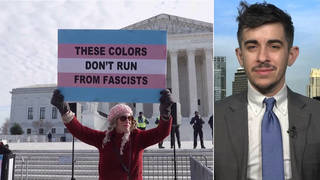
Guests
- Arli Christiansenior policy counsel in the ACLU’s National Political Advocacy Department.
- Laverne Coxactress and trans activist.
Links
In an unsigned order on Thursday, the Supreme Court allowed the Trump administration to require U.S. passports to list travelers’ sex assigned at birth, another blow to the rights of transgender, nonbinary and intersex people, who had been able to select sex markers aligning with their gender identity or to use a gender-neutral X. Thursday’s order is an interim ruling while the passport case makes its way through lower courts.
“The harm and the targeting of this policy towards intersex, nonbinary and trans people is terrifying. It makes it very scary to travel, to trust that you’ll be able to get through security, that you’ll be able to get on your flight,” says Arli Christian, senior policy counsel with the American Civil Liberties Union.
We also get reaction to the order from actress and activist Laverne Cox, who says trans people will persevere despite the discriminatory policy. “No matter what they say about our ID documents, we are still who we are, and we will find a way to be ourselves no matter what,” she says.
Transcript
AMY GOODMAN: The conservative-majority Supreme Court Thursday allowed the Trump administration to temporarily enforce a discriminatory passport policy against transgender, nonbinary and intersex people, while litigation in the case Trump continues through the lower courts.
After the decision, Attorney General Pam Bondi wrote on X, quote, “Attorneys at @TheJusticeDept just secured our 24th victory at the Supreme Court’s emergency docket. Today’s stay allows the government to require citizens to list their biological sex on their passport. In other words: there are two sexes, and our attorneys will continue fighting for that simple truth,” Bondi said.
Going back to 1992, the State Department has allowed for trans Americans to update their sex designations, and an X marker was added under the Biden administration. LGBTQ+ advocates have argued this policy will expose trans and intersex people to real danger while traveling. The ACLU has successfully won in the lower courts, arguing the policy is a violation of the Equal Protection Clause of the Constitution. The Trump administration has appealed.
Thursday’s order granting a stay on the lower court ruling for a temporary injunction made no mention of potential harm to plaintiffs. In their unsigned decision, the conservative majority wrote, quote, “Displaying passport holders’ sex at birth no more offends equal protection principles than displaying their country of birth — in both cases, the government is merely attesting to historical fact without subjecting anyone to differential treatment,” unquote.
In a scathing dissent, Justice Ketanji Brown Jackson said, quote, “The documented real-world harms to these plaintiffs obviously outweigh the government’s unexplained (and inexplicable) interest in immediate implementation of the passport policy,” she said, and went on to say her colleagues had, quote, “once again paved the way for the immediate infliction of injury without adequate (or, really, any) justification,” unquote.
For more, we’re joined by Arli Christian, senior policy counsel of the ACLU in Washington, D.C.
Welcome to Democracy Now! Talk about the significance of this Supreme Court ruling. And what happens next?
ARLI CHRISTIAN: Thank you, Amy, so much for having us here.
And really, you know, this decision by the Supreme Court, this is an emergency stay, as you mentioned. The Supreme Court has decided that the government can move forward in implementing this harmful, discriminatory policy that requires a sex assigned at birth on your original birth certificate to be printed on passports. And the harm is quite immediate, right? We have had a preliminary injunction in place in this case since April, and that has prevented the federal government from changing their 33-year-old policy, as you mentioned, of allowing people to have a passport that reflects who they are. For now, the Supreme Court has stayed that injunction, so now the federal government will be moving forward with printing passports that do not reflect who an individual is. Really harmful for the moment, but the fight is not over. We are still in the courts. We are still in the 1st Circuit looking at this injunction. We are still with the district court looking at the actual merits of the case, which were not considered in this Supreme Court stay.
AMY GOODMAN: What happens to people, for example, who have X on their passport right now?
ARLI CHRISTIAN: Yeah, so, Amy, you know, this decision and the actions of the federal government are causing chaos, panic, confusion among the trans, intersex, nonbinary communities across the country. The fact of the matter is, if you have a validly issued passport with an M, an F or an X, you are eligible to travel with that passport. That is, the State Department said that even when they reversed the policy back in January, and that continues to be the case.
However, there have been lots of actions that have scared people, and this stay is one of them. We are still working with the government’s lawyers to find out what will happen to the passports that were — that were issued, correctly issued, during the course of this injunction, and people are scared about that. And, you know, generally speaking, the harm and the targeting of this policy towards intersex, nonbinary and trans people is terrifying. It makes it very scary to travel, to trust that you’ll be able to get through security, that you’ll be able to get on your flight — you know, things that every person in the United States should not have to worry about. We all deserve the right to travel freely with dignity, with respect, as exactly who we are, and that is something that the administration is attacking right now.
AMY GOODMAN: Last night, I had a chance to speak with Laverne Cox after a showing of the new documentary called Heightened Scrutiny. Laverne Cox is the actress and trans activist. I asked her to respond to the Supreme Court’s ruling.
LAVERNE COX: What I think is really important for me to remember and for all my trans siblings out there to remember is that the government cannot tell us who we are, and they will never be the arbiter of our identities. No matter what they say about our ID documents, we are still who we are, and we will find a way to be ourselves no matter what. We must, because living a lie, trying to be someone else, is death. It’s an internal death. So, no matter what the government says or decrees, we will continue to be ourselves, our beautiful, anointed selves, because trans is beautiful, because trans rights are human rights, and because trans people are anointed.
AMY GOODMAN: Trans actress Laverne Cox.
The ACLU case stems from an executive order signed by President Trump in January that denies the existence of trans and intersex people and says, quote, “It is the policy of the United States to recognize two sexes, male and female,” unquote. The order requires identity documents, like passports, to provide only male and female sex designations, which must be based on a person’s sex, quote, “at conception.” This is one of the plaintiffs in the case, the content creator and trans activist Zaya Perysian.
ZAYA PERYSIAN: I’m a transgender woman. I applied to renew my passport and have it marked as female, and they refused, and they sent it back to me as male. He does not get to tell me who I am. Only I do. And now I’m at high risk of something bad happening to me if I were to travel abroad. This policy is dangerous, and it is unfair to every single trans, nonbinary or intersex person that there is. I’m an American, and, yes, I’m transgender, but I deserve to be able to travel freely without fear or repercussion. We deserve the freedom to be ourselves. No politician should be able to take that away. This is just a small part of a broad effort by the Trump administration to push trans people out of public life and act like we don’t exist. They want to ban our healthcare, censor our speech, control our lives. And I’m not just going to sit there and let it happen. We’re not going to sit here and let it happen. We deserve better than this, because all people deserve better than this. And, Donald Trump, we’ll see you in court.
AMY GOODMAN: As we wrap up, Arli Christian, what do you expect to happen next?
ARLI CHRISTIAN: Well, we are continuing to fight to stop this harmful policy. And as you’ve heard from so many of our plaintiffs and so many trans, nonbinary, intersex people across the country, this is so harmful. And the ACLU will not stand by and watch as the administration targets and harms a population of our country with no legitimate government reason. So we are continuing to fight. We’ll continue to fight on the merits of the case. And, you know, this is part of the ACLU’s strong belief that the Constitution covers all of us, and it covers the rights and protections and privacy and dignity of every single person. And so, we will — we will continue to fight on this policy.
AMY GOODMAN: Arli Christian, we want to thank you for being with us, senior policy counsel in the ACLU’s National Political Advocacy Department, focused on initiatives to support and protect the LGBTQ community.
Coming up, we look at the Supreme Court battle over Trump’s tariffs policies and more. We’ll speak to Lisa Graves. Her new book, Without Precedent: How Chief Justice Roberts and His Accomplices Rewrote the Constitution and Dismantled Our Rights. Stay with us.
[break]
AMY GOODMAN: “Never Buy the Sun,” by Billy Bragg, performing in our Democracy Now! studio.













Media Options